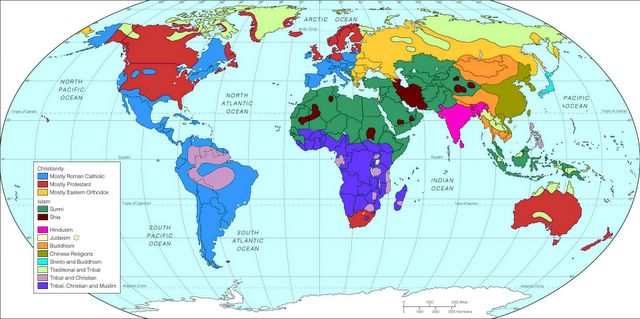Location, Location, Location
John Loftus, in his book, Why I Rejected Christianity, makes an excellent point about religious adherence relative to geography. He asserts that people will adhere to a religion or a variation/sect of that religion based on where they were born. Simple statistics give his assertion definite credence.
Rather than reinvent the wheel by putting this in my own words, let me quote another blog.
..I'm with John on this one. From the atheist's perspective, it seems too coincidental that religions just happen to dominate certain geographic locations and culture.
Consider this map of world religions found here:
Here's the key enlarged a bit in case it is too small in the picture:Map Key
Now, from an atheist's perspective, it certainly seems reasonable to assume that, generally speaking, people adopt a religion because it is part of the culture of the geographic region they are from. In India, most people are Hindu. In the Middle East, most people are Muslim (though, some of the Christians here have made a good point that this is a state-imposed religion in much of the Middle East; I still think that it might be a stretch to assume that most Muslims in the Middle east only believe from coercion). In South America, most people are Roman Catholic. In the US, there is a close split between Roman Catholics and Protestants, but even these are geographically located.
I think that Christians, here, might even agree with this partially except in regards to their own Christianity. It doesn't seem unreasonable for a Christian to also assume that a person is Hindu because they grew up in a country of Hindus. I'm sure the reformed among us would say that these people have rejected the Christian god because they love their sin and that they have adopted a religion only to justify their rebellion, but it still seems reasonable to conclude that they adopted that particular religion because it was the popular religion of that geographic location.
I know that most Christians, here, believe atheism is a religion and we hold it like any other religious person holds their faith. I know that the Christians, here, believe that we are only atheists because we love our sin and we want to deny the Christian god's sovereignty over us. But I have to say, as honestly as I can, that it doesn't feel that way to me.
I feel that I am "unaffiliated" when it comes to religion. I feel that I am not a Christian because there is simply no good reason to believe and a lot of reasons not to believe. My moral life since leaving my faith is virtually unchanged. I have been faithful to my wife. I have a job that most people would not work that allows me to help poor, racial minorities in an infamously difficult inner-city setting. I have very close friends (all of whom are Christians, by the way--three career missionaries, two seminary students, one seminary graduate (i.e. aside from the career missionaries who are also seminary graduates)), a good family (who are also all Christian), etc.
My point is that it feels to me that, because I am unaffiliated, I am being "courted" by the various religions. The Muslims are recommending Islam, the Hindus are pushing Hinduism, the Christians are offering Christianity (in all of its various forms). . . Each of these groups say that theirs is the only "true" religion. I look at the map above, though, and I wonder if that same person would be arguing for a different religion if they had been born in a different place in the world.
In other words, it is hard not to dismiss a religious person's claim that their religion is the truth when it certainly seems, from my point of view, that that same person would be pushing another religion had they been born in a different part of the world.
...But can the Christians, here, not also admit that, from our point of view, it is certainly suspicious that world religions dominate geographically and that it is not unreasonable for us to conclude that religions are products of culture and geography, not products of "truth" and "falsehood"?




1 comment:
Well, a few hundred years ago there were no Catholics in South America, and the spread in Africa has been very recent (100+years). Not to mention the growing number in East Asia, notably South Korea and China. None of these areas were "originally" Christian, but are today the areas that many churches see the most growth.
In contrast, the areas were Christianity has a really long tradition, notably Europe, many people are falling away from faith...
So your argument of geographical adherence is pretty ridiculous...
Post a Comment